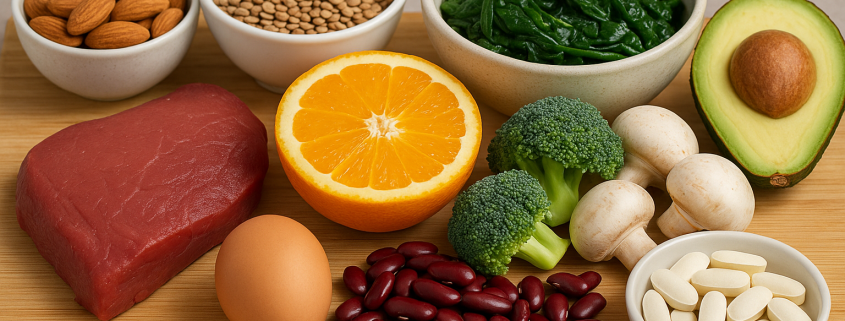Top 10 Nutrient Deficiencies I See in My Clients
Introduction
Why Nutrient Deficiencies Matter
Nutrient deficiencies can significantly impact energy levels, immune function, and long-term health — and as a nutritionist in London, I often see gaps even in people who believe they’re eating a balanced diet. Understanding and addressing these deficiencies is crucial for supporting overall wellbeing, improving daily energy, and preventing future health issues.
Who Is Most at Risk?
Busy professionals, vegans, vegetarians, people with digestive issues, and those under chronic stress often face multiple nutritional gaps. This guide walks you through the top 10 nutrient deficiencies, why they matter, and how to fix them using food, testing, and supplementation.
What Are Nutrient Deficiencies?
These occur when your body lacks sufficient vitamins or minerals to function optimally. Deficiencies may develop silently but can cause fatigue, poor concentration, and long-term risks such as osteoporosis or cardiovascular disease. Lifestyle factors often contribute.
Why Are Nutrient Deficiencies So Common?
Factors include highly processed diets, poor soil quality, chronic stress, medications, digestive imbalances, and restrictive eating habits. Many go undetected until symptoms appear or testing is performed.
Top Nutrient Deficiency #1: Iron
Iron deficiency is common, especially among menstruating women and vegetarians. Symptoms include fatigue, brain fog, shortness of breath, and lowered immunity.
How to Fix Iron Deficiency:
- Eat red meat, lentils, and spinach
- Combine with vitamin C-rich foods for enhanced absorption
- Check ferritin and haemoglobin levels before supplementing
Top Nutrient Deficiency #2: Vitamin B12
B12 is essential for nerve health and energy. Deficiency can cause tingling, mood disturbances, and fatigue, particularly in vegans, vegetarians, or those with low stomach acid.
How to Fix Vitamin B12 Deficiency:
- Use sublingual B12 or B12 injections if needed (under supervision)
- Monitor serum B12 and homocysteine
- Include eggs, dairy, and meat
Top Nutrient Deficiency #3: Vitamin D
Limited sunlight, especially during UK winters, makes vitamin D deficiency common. It affects immunity, bone health, and mood, with darker-skinned individuals or indoor workers at higher risk.
How to Fix Vitamin D Deficiency:
- Take a vitamin D3 supplement daily (paired with K2 if possible)
- Check your levels regularly through blood tests
- Consume fatty fish, egg yolks, mushrooms, and fortified plant milks
- Get safe sun exposure when possible (10–15 minutes at midday)
Top Nutrient Deficiency #4: Magnesium
Magnesium supports over 300 enzyme systems and is vital for sleep, stress, and muscle function. Stress, caffeine, and alcohol deplete magnesium, causing cramps, anxiety, or insomnia.
How to Fix Magnesium Deficiency:
- Eat nuts, seeds, leafy greens, and dark chocolate
- Use magnesium citrate or glycinate based on symptoms
- Consider Epsom salt baths for transdermal support
Top Nutrient Deficiency #5: Zinc
Zinc is essential for immunity, skin health, and tissue repair. Poor soil, vegan diets, and chronic illness can lead to deficiency.
How to Fix Zinc Deficiency:
- Eat red meat, shellfish, seeds, and legumes
- Supplement short-term during illness or infections
Top Nutrient Deficiency #6: Omega-3 Fatty Acids
Low omega-3 intake affects brain function, cardiovascular health, and inflammation. Most people consume too many omega-6 fats.
How to Fix Omega-3 Deficiency:
- Eat oily fish 2–3x/week (sardines, mackerel, salmon)
- Take algae-based supplements if plant-based
- Reduce processed seed oils high in omega-6
Top Nutrient Deficiency #7: Iodine
Iodine supports thyroid function and is essential during pregnancy. Vegan or dairy-free diets may lead to low intake.
How to Fix Iodine Deficiency:
- Eat seaweed, fish, eggs, and dairy
- Use iodine supplements cautiously — excess can be harmful
- Test thyroid markers alongside iodine levels
Top Nutrient Deficiency #8: Folate (Vitamin B9)
Folate is critical for cell growth and pregnancy. Alcohol and poor digestion deplete folate, causing fatigue and anemia.
How to Fix Folate Deficiency:
- Eat leafy greens, lentils, oranges, and asparagus
- Choose methylfolate for better absorption
Top Nutrient Deficiency #9: Calcium
Calcium is essential for bone and muscle health. Dairy-free diets may require fortified foods or certain greens. Vitamin D is needed for proper absorption.
How to Fix Calcium Deficiency:
- Use fortified plant milks, sesame seeds, almonds, and tofu
- Ensure vitamin D levels are sufficient
Top Nutrient Deficiency #10: Riboflavin (Vitamin B2)
Riboflavin supports energy and antioxidant function. It may be low in calorie-restricted or dairy-free diets.
How to Fix Riboflavin Deficiency:
- Eat dairy, eggs, mushrooms, and almonds
- Consider a B-complex if diet is restrictive
Conclusion
These top 10 nutrient deficiencies are common but correctable. Assess your needs, monitor levels, and follow a balanced plan to restore health and vitality.
Disclaimer
This article is for educational purposes only. Always consult a qualified healthcare professional before changing your diet or taking supplements.
Working with a Nutritionist
Book an appointment today if you feel like you need more assistance or direction to reach your goals.
Online consultation with a Nutritionist is available for clients who live outside the London area or who are unable to come to my London office. You can enjoy the online consultation from the comfort of your home or office and you will be given the same level of personal attention and care that you would experience coming to see the Nutritionist in person.
Please note, the links provided are Amazon affiliate links. If you buy something using these links, I will receive a small commission, at no additional cost to you. Rest assured that all products recommended have been personally used and endorsed by myself.




Leave a Reply
Want to join the discussion?Feel free to contribute!